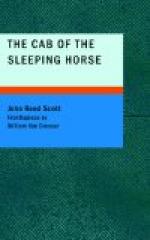He gave the necessary order; when the letter was brought he passed it to Marston.
“I’ll read the copy, if you’ll hold the original,” he said; and proceeded to call off the letters with amazing rapidity. “Correct, isn’t it?” as he ended.
“Yes!” said Marston returning the original to Carpenter. He wanted in every way to disarm suspicion; moreover, a copy could be made more readily from a large typewritten edition than from the small, written original. “Now for the code-book and the last key-word—a l’aube du jour, I think it is ... yes, a l’aube du jour, it is,” and he handed the book across. “Shall we try it first, Mr. Carpenter?”
“By all means,” said Carpenter. “Shall I set it down, or will you?”
One would never have imagined from his expression or his intonation that he had already tried a l’aube du jour for the key-word and failed; nor that why he had failed he now knew. The book was right as to the word, and the slip that Harleston had taken from Crenshaw’s pocket-book confirmed it. A l’aube du jour was not the key-word but the key-word was constructed from it by some arbitrary rule; and that rule was susceptible of solution. After he was free of this fellow Marston, he would solve the problem quickly enough. It was as sure as tomorrow. The prescience was come.
“About twenty letters should be enough for experiment?” he suggested, taking up a test card.
When he had written the key-word and the letters under it, he, scarcely without reference to the Blocked-Out Square, wrote the translation. Marston did the same, very much slower.
“It doesn’t fit!” Marston announced. “You can’t make anything out of AGELUMTONZN, and so forth.”
“I can’t!” Carpenter smiled—and waited. Would Marston suggest the transposed or elided word?
“I’m disappointed,” Marston confessed, “I thought sure we had it. Let’s try the next key-word in the book.”
They tried it, and the next, and all the rest. None of them translated the letter.
It took more than an hour; at the end, as a full measure of good faith and because it was of no further use to him—he having preserved a copy—Marston insisted that Carpenter retain the original of the French code-book and have a copy made, after which the book could be returned to him at the Chateau. During this hour and more his hand was in and out in his side coat-pocket. When he left the room there went with him, in that pocket, a copy of the original letter—roughly made by the sense of touch alone, yet none the less a copy and sufficiently distinct to be decipherable. For years Marston had practised writing in the dark and under all sorts of handicaps. In his pocket, a number of small slips of paper and a pencil were concealed. He would write a line, then take his hand from his pocket; after a time he would shift the page of paper, write another line, and then another, and so on until the copy was made. And all the while he was so frankly communicative, with apparently not the slightest intent to obtaining a copy—even tearing up the paper on which were the various trial translations—that he completely deceived Carpenter. When he left, the latter went with him to the elevator and bowed him down.




